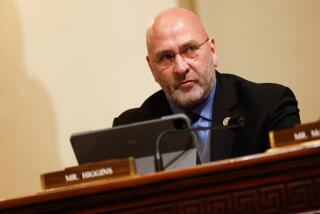Two Congressmen Linked to Bank Scandal to Resign : Ethics: McHugh headed the House probe of the check writers. Davis was listed as one of the worst ‘abusers’ of the overdraft system.
- Share via
WASHINGTON — Two more congressmen--the chairman of a House Ethics panel and one of the worst “abusers” in the House bank scandal--announced their intentions Monday to step down at the end of their terms, raising the number of congressional departures to an extraordinary high of 60.
Rep. Matthew F. McHugh (D-N.Y.), 53, a nine-term congressman who led the investigation into overdrafts at the now-notorious bank, said he had tired of having to defend his character just because he was a member of Congress.
Rep. Robert W. Davis (R-Mich.), 59, who was listed as the third-worst offender in the explosive bank scandal for writing 878 bad checks worth more than $344,000, said he feared defeat after coming under heavy criticism in his district.
In a related development, a federal judge ruled Monday that a special Justice Department prosecutor may subpoena the House bank records of every member of Congress for a 39-month period to investigate allegations of “check kiting” at the now-closed facility.
Shortly afterward, the House bank turned over 41 rolls of microfilmed bank records.
In his ruling, U.S. District Judge John Garrett Penn rejected a challenge to the subpoena brought by five Democratic members of Congress who argued that it was overly broad and amounted to a political fishing expedition.
Members of the House, Penn held, “do not have a legitimate expectation of privacy in the records,” and should be treated the same as depositors in any bank. The House Ethics Committee has reported that 325 current and former members wrote more than 24,000 overdrafts at the bank from mid-1988 to last Oct. 3.
The planned departure of Davis and McHugh further swelled the ranks of those who have reacted to voter anger toward incumbent officeholders or have been affected by redistricting. As many as 100 lawmakers could step down or be cast out at the end of their terms this year. Such a turnover would produce the largest freshman class since the post-Watergate election sent 92 new members to the House in 1975.
But departing members of Congress will not leave empty-handed.
Most of those retiring from Capitol Hill will be eligible for generous pensions, ranging from a low of 12.5% of their $129,100 salaries up to 80% of annual pay, depending on their age and length of service. For example, a five-term congressman leaving at the end of this year would be entitled to an annual pension of $31,580 at age 62.
Others who served in Congress before 1980 and leave before January are eligible to convert campaign funds to personal use.
An informal survey indicated that most have promised to give campaign money to charity or other political candidates rather than pocket the funds. (Congressmen deciding to make donations are not entitled to federal income tax breaks for gift-giving.)
But a few with large campaign funds--including Davis--said they had made no decision about whether to keep the money or give it away. Rep. Larry J. Hopkins (R-Ky.), who is entitled to pocket $660,682, also lists himself as undecided.
McHugh could keep about $131,680, but instead will “pay the bills and give the rest to charity,” according to a spokesman. Similarly, aides to Rep. Bob Traxler (R-Mich.) said he would split $434,491 between a Bay City, Mich., organization, an education foundation and contributions to other candidates.
Rep. Edward R. Roybal (D-Los Angeles), who could keep $197,879, said he has earmarked his campaign funds for a gerontology center at Cal State Los Angeles to promote research, training of staff workers and an outreach program.
Others are going to keep campaign funds handy in case they run for office again. They include Rep. Ed Jenkins (D-Ga.), with $467,600 on hand, who said through a spokeswoman he intends to explore prospects for a statewide elective office in 1994, and Rep. Howard Wolpe (D-Mich.), who has $139,753 on hand. “If I don’t run for another office, it’ll be given to charity,” Wolpe said recently.
Rep. Brian Donnelly (D-Mass.) intends to give $434,000 to charities, scholarships and Democratic candidates in Massachusetts, a spokesman said, while Rep. William S. Broomfield (R-Mich.) reportedly plans to put his $655,652 into a charitable foundation.
If a bill introduced by Rep. George W. Gekas (R-Pa.) becomes law, however, the campaign funds of all congressmen would be turned over to the Treasury once the lawmaker left office. A spokesman said Gekas believes the existing law creates an “outrageous loophole” that lets such funds be spent for personal purposes.
More to Read
Get the L.A. Times Politics newsletter
Deeply reported insights into legislation, politics and policy from Sacramento, Washington and beyond. In your inbox twice per week.
You may occasionally receive promotional content from the Los Angeles Times.










